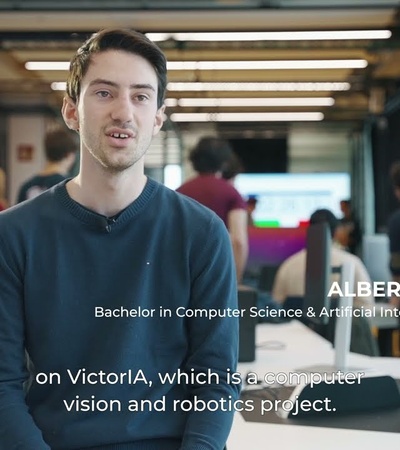Bachelor in Computer Science and Artificial Intelligence
Bachelor in Computer Science and Artificial Intelligence
Create AI technologies to reshape industries
- Home
- Studies
- Undergraduate Degrees
- Bachelor In Computer Science And Artificial Intelligence
BACHELOR IN COMPUTER SCIENCE AND ARTIFICIAL INTELLIGENCE STUDENTS PROJECTS
BACHELOR IN COMPUTER SCIENCE AND ARTIFICIAL INTELLIGENCE STUDENTS PROJECTS
At IE University, we believe in a hands-on learning approach that empowers students to turn theory into practice, gaining real-world experience while they study. For students in the Bachelor in Computer Science and Artificial Intelligence, this means working on innovative projects that push the boundaries of technology. Whether developing AI-powered robots, creating virtual assistants, or mastering automation tools, our students are constantly applying their knowledge in state-of-the-art laboratories like the Robotics Lab. Supported by cutting-edge resources and an inspiring community, they develop the skills needed to excel in tomorrow's tech-driven world.

WANT TO KNOW MORE?

Frequently Asked Questions
Frequently Asked Questions
What kind of hands-on projects do students work on during the program?
Students engage in various practical projects, including developing AI-powered robots, creating virtual assistants and mastering automation tools. These projects are conducted in state-of-the-art facilities like the Robotics Lab, which provide an ideal environment for experiential learning and innovation.
Can I apply theoretical knowledge to real-world problems during the program?
The program is designed to ensure that students have many opportunities to apply theoretical concepts to practical scenarios. Through case studies, group projects and individual tasks, students are challenged to solve real-world problems. This methodology bridges the gap between classroom learning and practical application, preparing students for industry challenges.
Can students participate in tech competitions during the program?
IE University encourages participation in challenges and competitions that foster creativity and innovation, such as the IE Sustainability Datathon, the International Quant Championship or the Tech Venture Bootcamp. These competitions provide platforms for collaborating on solutions to real-world problems, enhancing the learning experience and building skills that will serve students in their future careers.